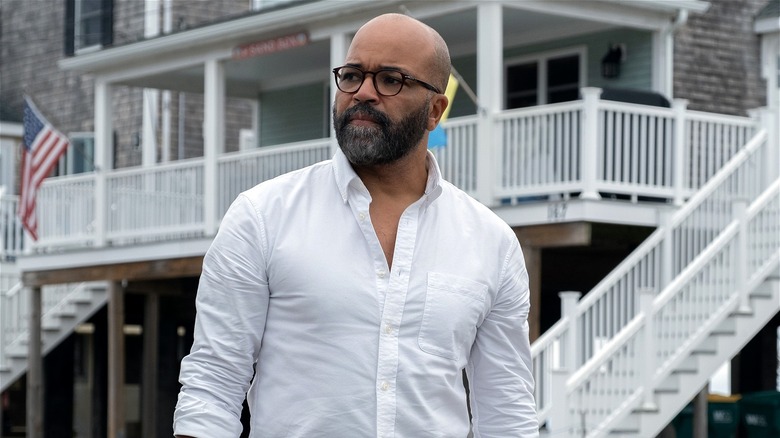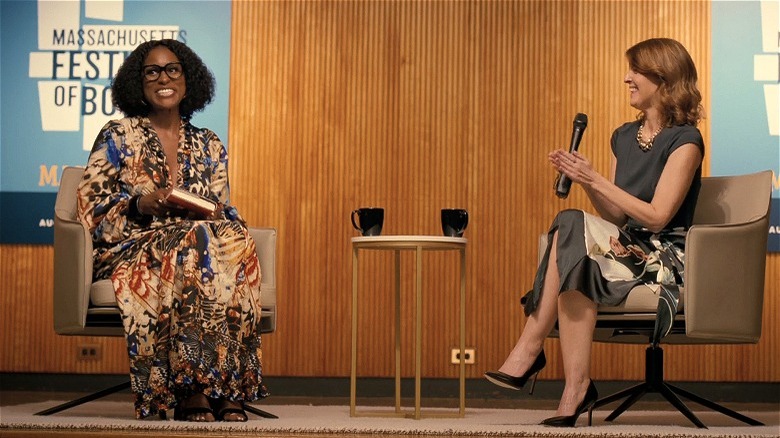American Fiction Review: Jeffrey Wright Excels In One Of The Year's Best
- Funny, thought-provoking satire
- Engrossing character relationships
- Jeffrey Wright is fantastic — as are all the actors
- The ending isn't fully satisfying, though that's by design
"American Fiction," writer-director Cord Jefferson's adaptation of the Percival Everett novel "Erasure," has a killer satirical hook: a disgruntled African American author, Thelonious "Monk" Ellison (Jeffrey Wright), writes the most stereotypical "Black book" he can under the fake persona of wanted fugitive "Stagg R. Leigh" — only for this prank to become the biggest success of his career. Doing "The Producers" for the publishing industry while brutally satirizing media exploitation of Black trauma would be enough to make "American Fiction" one of the most interesting comedies of the year.
And yet perhaps the most impressive thing about Jefferson's feature debut is that it would still be a damn good movie even without this hook. It's a while before Monk finally sits down to write the pandering hood bestseller originally titled "My Pafology" (and later retitled to something we can't publish here), but by the time that happens, the audience is already fully invested in everything else going on in Monk's life. Replace the literary hoax with some other big lie necessitating embarrassed secrecy and the story would still work as a family drama, a romance, and a character study.
This strong dramatic foundation gives the racial satire extra heft. "American Fiction" isn't just decrying how books and movies reduce the Black experience to slavery, poverty, crime, and police violence — it's leading by example in showing there's a wide variety of other stories to be told.
Jeffrey Wright excels with a rich lead role
Similar to Paul Giamatti's character in "The Holdovers" and Nicolas Cage's in "Dream Scenario," Monk is a professor who just doesn't connect with his students. After one confrontational class too many, he's put on leave, and he tries to refocus his unsuccessful efforts on finally selling his latest book about Greek mythology. A trip to a literary convention in Boston leads him to begrudgingly return to his family home.
Monk has been so distant from his family for so long that he's genuinely shaken to learn his deceased father had affairs — an open secret everyone else in the Ellison household was well aware of. Both his sister, Lisa (Tracee Ellis Ross), and his brother, Cliff (Sterling K. Brown), have gone through messy divorces, with the latter now trying to make up for lost time as a newly out gay man. More troublingly, their mother, Agnes (Leslie Uggams), is showing signs of Alzheimer's, and even beloved housekeeper Lorraine (Myra Lucretia Taylor) can no longer care for all her needs.
So things are pretty rough in Monk's life — but they're not rough in the ways American pop culture usually portrays Black people's lives as being. As aggravated as he is with his personal issues, it's the popularity of a novel titled "We's Lives in Da Ghetto" that really gets Monk's gears grinding. Author Sintara Golden (Issa Rae) has been promoting her bestseller as a work of authentic representation, but to Monk's ears, it sounds like stereotypical drivel meant to appease guilty white liberals. But there's money in such appeasement, and paying Agnes' assisted living bills sure is expensive ...
Cord Jefferson's screenplay expertly juggles multiple narrative threads. The author story and the family story both feed into each other, and so too does Monk's budding romance with his neighbor Coraline (Erika Alexander), who's a fan of Monk's writing but increasingly put off by his suspicious secrecy. All of the central characters feel real and fully formed. Jeffrey Wright, a brilliant actor usually cast in supporting roles, shines in this all-too-rare opportunity as a leading man. He's particularly hilarious when code-switching into the role of "Mr. Leigh." Brown and Rae also stand out in an all-around exceptional ensemble, taking roles that could have been played more jokey and treating them with serious nuance while still nailing the comedy.
No easy answers
After winning audience favorite honors at multiple film festivals, including the often Oscar-forecasting Toronto International Film Festival prize, "American Fiction" has been thrust into the center of awards season conversation. This is deserving, but also ironic, given yet another one of the many topics the film covers is the ridiculousness of awards. On top of everything else he's dealing with, Monk is invited to be a judge for a literary prize that's trying to include more diverse voices — and the one other Black judge happens to be Monk's artistic nemesis, Sintara.
The scene where Monk finally hashes out his issues with Sintara might be the most interesting in the film. It would be easy to make Sintara a huckster villain, but from the start of the awards subplot, that doesn't seem to be the case. Given that nuance, it would then be easy for the debate between the characters to be one where Monk learns some sort of lesson from the woman he's made his enemy, but that doesn't really happen either. Instead, we get an argument between two equally compelling points of view where the viewer is forced to make up their own mind.
This refusal to provide easy answers also fuels what's sure to be the most divisive part of the film — its ending. Just as the drama has you on the edge of your seat, the movie lets go of all that tension with a swerve into meta territory. It's funny, but this sort of indecisive anticlimax can't help but disappoint. And yet that disappointment feels very much a piece with what "American Fiction" has been saying all along, and its closing wordless glance says perhaps all that can be said.
"American Fiction" opens in limited release on December 15, expanding to more theaters on December 22.


